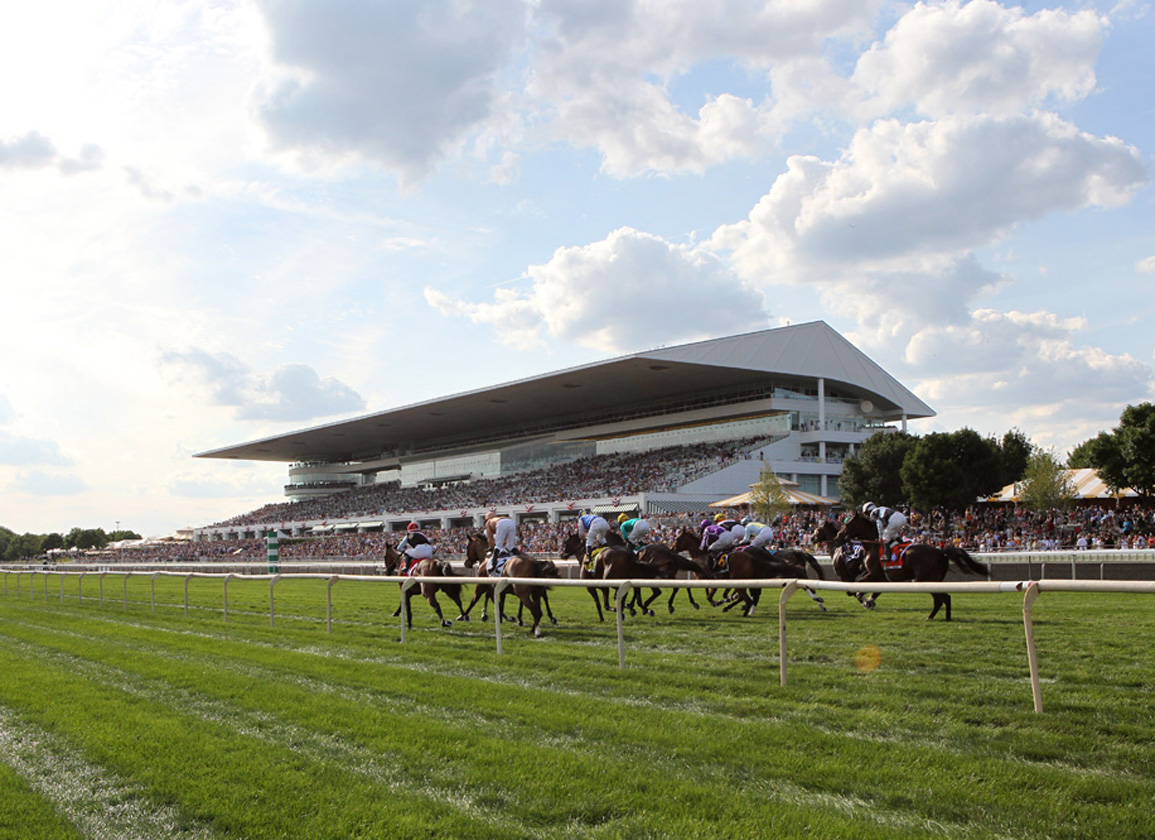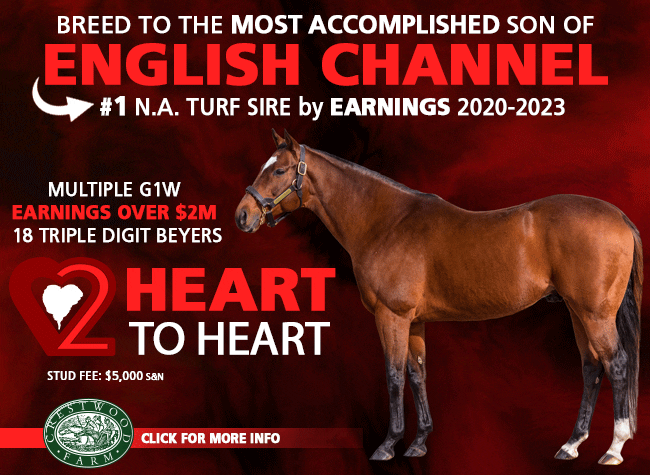By T. D. Thornton
Under the shadow of Arlington Park potentially going dark forever after Sept. 25, the Illinois Racing Board (IRB) on Thursday unanimously approved a 2022 race dates package that shifts the burden of hosting all Thoroughbred and Standardbred racing in the Chicago area to Hawthorne Race Course.
And while horsemen's groups for both breeds expressed gratitude for Hawthorne stepping up to implement a crammed-and-jammed, year-long race calendar that will be unprecedented in Illinois racing, representatives of the Illinois Thoroughbred Horsemen's Association (ITHA) said during the Sept. 23 meeting that the new arrangement isn't a viable long-term solution.
“Right now, on the Thoroughbred side, we're going to be going from 120 race days this year to 76 next year,” said David McCaffrey, the ITHA's executive director. “You always are reluctant to say we're at rock bottom because it maybe can get worse. But a second track in Chicago is so important for both breeds.
“And with Arlington's absence next year, we're seeing the importance of that second track play out. Because both breeds are having to share Hawthorne,” McCaffrey continued. “Hawthorne's having to turn their track [composition] over four times. One breed's going to be there for three months. Another breed's going to be kicked out for three months [for racing and training]. And then it's going to start all over again the latter part of the year. The importance of a two-track system in northern Illinois cannot be overstated.”
Half a century ago, greater Chicago had five competing tracks sharing Thoroughbred and Standardbred meets. Washington Park closed in 1977. Sportsman's Park briefly switched to auto racing in 2003 before being demolished. Maywood Park and Balmoral Park both shuttered in 2015.
In February of this year, Churchill Downs, Inc. (CDI), Arlington's corporate owner, announced an industry-devastating intention to close and sell Arlington. Although at least one known bidder in the sales process has stated an intention to keep Arlington alive for Thoroughbred racing, CDI long ago telegraphed its intention to sell the property for “non-horse racing” purposes, ostensibly so a new owner won't be able to compete with CDI's existing and proposed Chicago casinos.
On Thursday, for the fifth consecutive IRB meeting since CDI declared that Arlington would be snuffed out, nine of the 10 commissioners continued to maintain an astounding silence about the prospect of losing the state's most opulent and historic Thoroughbred venue.
The lone exception, once again, was commissioner Alan Henry, who, as he has at past IRB meetings, spoke passionately for about five minutes on what the loss of Arlington means for the sport in Illinois.
“I will tell you, frankly, that it dismays me to have to vote in favor of the 2022 racing dates that were reluctantly put before us today,” Henry said. “I'm well aware that it was the least-bad option. I also know that if this becomes the new normal in Illinois, we're on the road to the suffocation of an entire industry.
“The fault for this calendar, most of it, belongs to CDI. Their decision to permanently close Arlington Park, then to not apply for 2022 racing as a placeholder–even while one of the groups still alive in the bidding process wants to keep the track open–
has been a masterwork of corporate single-mindedness.”
Henry implored fellow commissioners to remember CDI's harmful actions if and when the gaming corporation ever comes before the IRB again to try and make a pitch for another racing license for a different track. He described CDI's decision to abandon Arlington as “a brutal clear-cut for the entire sport.”
Henry also urged fellow commissioners to “get in font” of another near-term problem involving CDI that he sees looming on the horizon: even after Arlington closes, it will still be generating revenue from advance-deposit wagering and off-track betting until Dec. 31. Normally, the portion of that revenue that goes to bolster the ITHA purse account would simply carry over into the next calendar year.
“But because there's no racing at Arlington next year, this issue now is what happens to that money, which is estimated to be about $800,000,” Henry said.
“I believe CDI should be brought in, under oath if need be, to confirm that they will live up to their obligation to deliver those funds to the [horsemen's purse account] in a timely fashion,” Henry said. “To insist on anything less would be a mistake, particularly given CDI's occasional talk about building a new track elsewhere in the state in some future year where it might say they would use those funds.”
ITHA president Michael Campbell tried to put a positive spin on the near-term deal to race at Hawthorne. But he added that the racing community can't ignore the bigger picture.
“We're excited about the [Hawthorne] racino being finally built out. It's a dream come true, particularly given the fact that for 20 years we've worked on this,” Campbell said. “And of course, our deep disappointment is that Arlington chose–or CDI chose–not to take advantage of [building its own racino].
“So we'll move forward into the future. I wish I could be as optimistic as [Hawthorne officials are],” Campbell said. “You know, we've got a lot of circumstances to overcome, including a divided schedule, a shared racetrack, the inability to train part of the year…
“It's great to talk about the future,” Campbell summed up. “But having said that, when's it going to happen? What can we rely on? What can we tell these people that are breeding these horses? What can we tell the people that own these horses? Because now, with Arlington's demise–or supposed demise, anyway–where does that leave us?”
McCaffrey supplied some breeding statistics to hammer home Campbell's point, noting that 15 years ago, Illinois annually produced about 2,400 Thoroughbreds.
By 2019, McCaffrey said, that number had plummeted to 420.
“It's like an 85% decrease in the amount of foals being produced. And the reason is that there's such a murky future, and has been for 20 years,” McCaffrey said.
Thoroughbreds in 2022 will race at Hawthorne between Apr. 2 and 30 on a two-day weekly schedule (Saturdays and Sundays). Between May 1 and June 24, that schedule gets bumped up to three days by adding Fridays, plus a stand-alone Thursday card on June 23.
In the fall, Thoroughbreds will race at Hawthorne on the three-day Friday-Sunday schedule between Sept. 23 and Dec. 31 (Christmas Eve and Day both dark).
Around and in between that dates structure, Hawthorne will conduct seasonal winter/spring and summer harness meets totaling 75 dates.
FanDuel Sportsbook and Horse Racing (known for 95 years as Fairmount Park before a corporate rebranding this year), is some 350 miles southwest of Chicago and is not considered part of the state's northern circuit. It will race 61 programs in 2022 between Apr. 19 and Sept. 24. The weekly schedule will be Tuesdays and Saturdays until June 12, with Fridays added thereafter.
Not a subscriber? Click here to sign up for the daily PDF or alerts.






